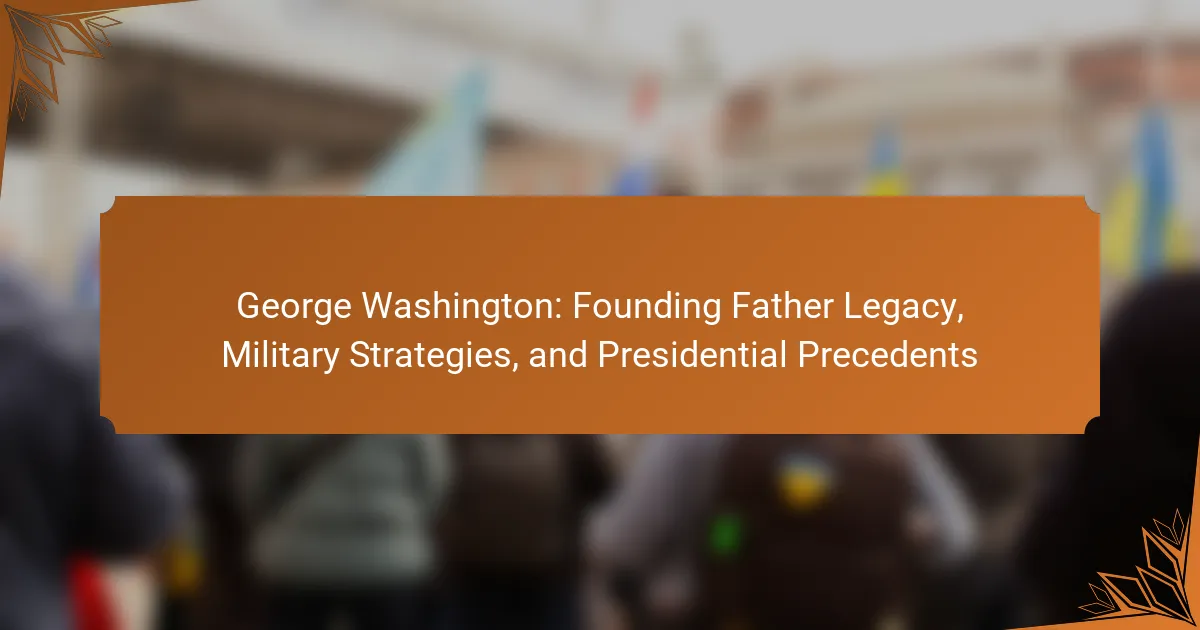George Washington is a central figure in American history, known for his role as a Founding Father, military leader, and first President of the United States. His leadership during the American Revolutionary War, particularly his strategic use of attrition and guerrilla tactics, was crucial in securing independence from British rule. Washington’s presidency established important precedents, including the two-term limit, the formation of a Cabinet, and a focus on neutrality in foreign affairs. His Farewell Address emphasized the dangers of political parties and foreign alliances, shaping the future of American governance and political discourse. This article explores Washington’s legacy, military strategies, and the foundational precedents he set for the presidency.

What is the legacy of George Washington as a Founding Father?
George Washington’s legacy as a Founding Father is foundational to the United States. He led the Continental Army to victory during the American Revolutionary War. His leadership secured independence from British rule. Washington presided over the Constitutional Convention in 1787. He played a crucial role in drafting the U.S. Constitution. His presidency set important precedents for future leaders. Washington established the tradition of a two-term limit for presidents. His Farewell Address warned against political parties and foreign alliances. These actions solidified his status as a key figure in American history.
How did George Washington influence the formation of the United States?
George Washington significantly influenced the formation of the United States through his leadership during the Revolutionary War and his role as the first President. He commanded the Continental Army, securing key victories that led to American independence. Washington’s leadership fostered unity among the colonies and established a precedent for civilian control of the military. As the first President, he set foundational policies and practices for the new government. His Farewell Address warned against political parties and foreign alliances, shaping future American foreign policy. Washington’s character and dedication earned him the title “Father of His Country.” His influence remains a cornerstone of American identity and governance.
What key principles did Washington advocate for during the founding period?
George Washington advocated for several key principles during the founding period. He emphasized the importance of national unity. Washington believed that a strong, united nation was essential for the survival of democracy. He also championed the rule of law. This principle ensured that all citizens, including leaders, were subject to the law. Washington supported a balanced government with checks and balances. He argued that this structure would prevent tyranny and protect individual liberties. Additionally, he promoted the idea of a strong central government. Washington saw this as necessary to maintain order and provide for the common defense. His Farewell Address underscored the dangers of political factions and foreign alliances. He warned that these could lead to division and conflict within the nation. Washington’s principles laid the foundation for the governance of the United States. His vision continues to influence American political thought today.
How did Washington’s leadership style shape the new nation?
Washington’s leadership style significantly shaped the new nation by establishing key precedents for the presidency. He emphasized the importance of unity and national identity during a time of division. Washington’s decision to step down after two terms set a standard for future presidents. His leadership fostered respect for the office and the rule of law. He prioritized diplomacy and sought to avoid entangling alliances, which influenced American foreign policy. Washington’s ability to inspire trust and confidence helped solidify the federal government’s authority. His leadership style balanced power among branches, reinforcing the system of checks and balances. By embodying virtues such as integrity and humility, he set a moral example for the nation.
What role did George Washington play in the Revolutionary War?
George Washington served as the Commander-in-Chief of the Continental Army during the Revolutionary War. He was appointed to this position by the Second Continental Congress in 1775. Washington led American forces against British troops throughout the conflict. His leadership was instrumental in key victories, including the Siege of Boston and the Battle of Yorktown. Washington’s strategies emphasized mobility and surprise, adapting to the strengths of his troops. He faced significant challenges, such as supply shortages and troop morale. Despite these obstacles, his resilience helped unify the colonies. Washington’s success in the war ultimately contributed to American independence.
What were Washington’s most significant military strategies during the war?
George Washington’s most significant military strategies during the war included strategic retreats, surprise attacks, and forming alliances. He often employed the tactic of retreating to preserve his army’s strength. This was evident during the Battle of New York in 1776, where he withdrew to avoid encirclement. Washington also executed surprise attacks, notably the crossing of the Delaware River in December 1776. This led to a crucial victory at the Battle of Trenton. Additionally, he focused on building alliances, particularly with France, which provided essential military support. These strategies collectively contributed to the eventual success of the Continental Army.
How did Washington’s decisions impact the outcome of the conflict?
Washington’s decisions significantly influenced the outcome of the conflict. His strategic leadership during the American Revolutionary War was crucial. He employed tactics such as surprise attacks and strategic retreats. The crossing of the Delaware River in 1776 exemplified his ability to turn the tide of battle. Washington’s choice to avoid large-scale confrontations often preserved his army’s strength. He also built strong alliances, notably with the French, which provided essential support. His commitment to a unified command helped maintain morale and discipline within his ranks. Ultimately, these decisions contributed to the American victory and independence.

What military strategies did George Washington employ?
George Washington employed several military strategies during the American Revolutionary War. He utilized a strategy of attrition to wear down British forces. Washington focused on avoiding large-scale confrontations when possible. He often engaged in guerrilla tactics, striking swiftly and retreating before the enemy could respond. Washington also emphasized the importance of intelligence and reconnaissance. He made effective use of local geography to his advantage. Notable victories at Trenton and Princeton demonstrated his strategic acumen. These strategies contributed significantly to the eventual American victory.
How effective were Washington’s military tactics in achieving victory?
Washington’s military tactics were highly effective in achieving victory during the American Revolutionary War. He employed strategies such as surprise attacks and strategic retreats. These tactics helped to preserve his army and maintain morale. For instance, the surprise attack on Trenton in December 1776 led to a crucial victory. This boosted American confidence and recruitment. Washington also utilized the terrain to his advantage in battles like the Siege of Yorktown. His ability to adapt tactics based on the situation was key to his success. Overall, Washington’s leadership and tactical decisions were instrumental in securing American independence.
What specific battles showcased Washington’s strategic acumen?
The specific battles that showcased Washington’s strategic acumen include the Battle of Trenton and the Battle of Yorktown. At the Battle of Trenton in December 1776, Washington executed a surprise attack against Hessian forces after crossing the icy Delaware River. This victory revitalized American morale and recruitment. The Battle of Yorktown in October 1781 demonstrated Washington’s ability to coordinate with French forces. He effectively laid siege to British General Cornwallis, leading to the British surrender. These battles exemplify Washington’s strategic foresight and adaptability in military leadership.
How did Washington adapt his strategies to changing circumstances?
Washington adapted his strategies by responding to the evolving military landscape of the American Revolutionary War. He shifted from conventional tactics to guerrilla warfare when faced with superior British forces. Washington emphasized mobility and surprise attacks to compensate for resource limitations. He also focused on building alliances, notably securing French support, which proved crucial in key battles. Additionally, he learned from setbacks, such as the defeats at New York and Philadelphia, adjusting his approach to prioritize defensive strategies. His ability to retreat and regroup demonstrated flexibility in command. Washington’s adaptability was evident in the successful siege at Yorktown, where he effectively coordinated land and naval forces.
What challenges did Washington face as a military leader?
George Washington faced numerous challenges as a military leader during the American Revolutionary War. He struggled with inadequate supplies and resources for his troops. The Continental Army often faced shortages of food, clothing, and ammunition. Washington also dealt with issues of troop morale and discipline. Many soldiers were inexperienced and lacked training. Additionally, he faced the challenge of coordinating with state militias, which often had different objectives. Washington encountered difficulties in securing foreign alliances for support, particularly from France. He also had to navigate the complexities of political pressures from Congress. These challenges tested his leadership and strategic abilities throughout the war.
How did Washington overcome resource limitations during the war?
George Washington overcame resource limitations during the war by implementing strategic alliances and innovative supply management. He formed critical alliances with France, which provided military support and supplies. Washington also utilized local resources by encouraging farmers to supply food and materials to the Continental Army. He organized foraging missions to gather necessary supplies from the surrounding areas. Additionally, Washington established a network of spies to gather intelligence on British movements, which helped conserve resources. His leadership fostered morale and commitment among troops, essential for enduring hardships. Through these methods, Washington effectively maximized limited resources to sustain the war effort.
What role did communication and intelligence play in his strategies?
Communication and intelligence were crucial to George Washington’s military strategies. Washington utilized effective communication to coordinate troop movements and relay orders. He understood the importance of maintaining morale through clear messaging. Intelligence gathering provided him with vital information about enemy positions and movements. He relied on spies and scouts for accurate assessments of British forces. This information allowed him to make informed tactical decisions. For example, Washington’s surprise attack at Trenton was made possible by intelligence about British troop placements. His ability to adapt strategies based on intelligence reports significantly contributed to his success in the Revolutionary War.

What presidential precedents did George Washington establish?
George Washington established several presidential precedents. He set the two-term limit for presidents, which became a standard until the 22nd Amendment. Washington also established the tradition of a Cabinet, appointing advisors to assist in governance. He emphasized the importance of neutrality in foreign affairs, avoiding entanglement in European conflicts. Washington’s farewell address warned against political parties and foreign alliances, shaping future political discourse. He also formalized the inaugural ceremony, establishing a precedent for the peaceful transfer of power. These actions laid the groundwork for the executive role in the U.S. government.
How did Washington’s presidency shape the executive branch of government?
Washington’s presidency established key precedents for the executive branch. He defined the role of the president as a leader and representative of the nation. Washington created a cabinet to advise him, setting a standard for future administrations. He emphasized the importance of a unified executive authority. His decision to step down after two terms established the tradition of presidential term limits. Washington’s leadership style promoted the idea of a strong, yet accountable executive. He navigated foreign relations, asserting the president’s role in diplomacy. These actions collectively shaped the executive branch’s structure and function in American government.
What key decisions did Washington make that set important precedents?
George Washington made several key decisions that set important precedents for the presidency. He established the tradition of a two-term limit by voluntarily stepping down after his second term in 1797. This decision reinforced the idea of a peaceful transfer of power and discouraged any notions of a monarchy. Washington also formed a Cabinet, which included key advisors like Alexander Hamilton and Thomas Jefferson. This practice established the precedent for a team of advisors to assist the president in decision-making. Furthermore, he asserted the power of the federal government during the Whiskey Rebellion in 1794, demonstrating that the government could enforce its laws. Washington’s Farewell Address emphasized the importance of national unity and warned against political parties and foreign alliances. Each of these decisions helped shape the future of the presidency and American governance.
How did Washington’s actions influence future presidents?
Washington’s actions set critical precedents for future presidents. He established a two-term limit, promoting the idea of peaceful transitions of power. His decision to step down after two terms influenced the 22nd Amendment, which formalized this limit in 1951. Washington also emphasized the importance of a strong executive branch. He navigated challenges like the Whiskey Rebellion, demonstrating federal authority. This action encouraged future presidents to assert federal power when necessary. His Farewell Address warned against political parties and foreign alliances. This advice shaped presidential conduct for generations. Washington’s leadership style, prioritizing unity and national interest, became a model for his successors.
What were the major policies implemented during Washington’s presidency?
The major policies implemented during Washington’s presidency include the establishment of a strong federal government, the implementation of the Judiciary Act of 1789, and the creation of a national bank. Washington prioritized the authority of the federal government to maintain order and unity. The Judiciary Act organized the federal court system, creating the Supreme Court and lower courts. The national bank was established to stabilize and improve the nation’s credit and financial system. Additionally, Washington issued the Neutrality Proclamation in 1793 to keep the United States out of foreign conflicts. These policies laid the groundwork for future governance and set important precedents for the nation.
How did Washington address issues of national debt and finance?
Washington addressed issues of national debt and finance by supporting the establishment of a national bank. He endorsed Alexander Hamilton’s financial plan, which aimed to consolidate state debts into a national debt. This plan facilitated the creation of a strong federal government and improved creditworthiness. Washington also implemented tariffs to generate revenue and stabilize the economy. He recognized the importance of a sound financial system for national unity. His administration successfully managed to pay off foreign debts and establish a foundation for future economic growth. Washington’s actions laid the groundwork for the United States’ financial system.
What foreign policy principles did Washington advocate?
George Washington advocated for neutrality, non-intervention, and the avoidance of permanent alliances. He believed that the United States should remain neutral in foreign conflicts. Washington warned against entangling alliances that could draw the nation into wars. He emphasized the importance of focusing on domestic issues over foreign entanglements. His Farewell Address outlined these principles clearly. Washington’s stance aimed to promote national unity and independence. He believed that foreign alliances could threaten American sovereignty. His principles shaped early American foreign policy significantly.
What lessons can be learned from George Washington’s legacy?
George Washington’s legacy teaches the importance of leadership, integrity, and unity. He demonstrated effective leadership by navigating the nation through the Revolutionary War. Washington’s commitment to integrity helped establish trust in the new government. He prioritized national unity, warning against political factions in his farewell address. His voluntary step down from power set a precedent for future presidents. This act reinforced the principle of democratic governance. Washington’s ability to balance various interests shows the value of compromise. His legacy emphasizes the significance of civic duty and public service.
How can Washington’s leadership principles be applied today?
Washington’s leadership principles can be applied today through integrity, humility, and the importance of unity. Integrity in leadership fosters trust and accountability. Humility allows leaders to listen and learn from others. Washington emphasized the significance of unity during the founding of the nation. He believed that a united front was essential for overcoming challenges. His Farewell Address warned against political factions, which remains relevant in today’s polarized environment. By embracing collaboration and bipartisanship, leaders can navigate contemporary issues effectively. Washington’s example illustrates the value of servant leadership, prioritizing the needs of the people over personal gain. These principles guide modern leaders in building strong, effective teams and communities.
What are the enduring impacts of Washington’s decisions on modern governance?
Washington’s decisions have significantly shaped modern governance. His establishment of a strong federal government laid the groundwork for the U.S. political system. Washington’s two-term limit set a precedent for presidential tenure, influencing future leaders. His Farewell Address emphasized the dangers of political parties and foreign alliances, guiding contemporary political discourse. The creation of a cabinet system for advice and administration has become integral to executive governance. Washington’s leadership style promoted the idea of a unifying national figure, which is still relevant today. His commitment to a peaceful transfer of power remains a cornerstone of American democracy. These impacts reflect Washington’s enduring influence on the structure and principles of modern governance.
George Washington is the primary entity of this article, which examines his legacy as a Founding Father, his military strategies during the American Revolutionary War, and the presidential precedents he established. The article highlights Washington’s leadership in securing American independence, his influential role in drafting the U.S. Constitution, and the principles he advocated for national unity and governance. It also details his military tactics, key battles, and how his decisions shaped the executive branch and modern governance, emphasizing the enduring impact of his leadership on contemporary political discourse and practices.



